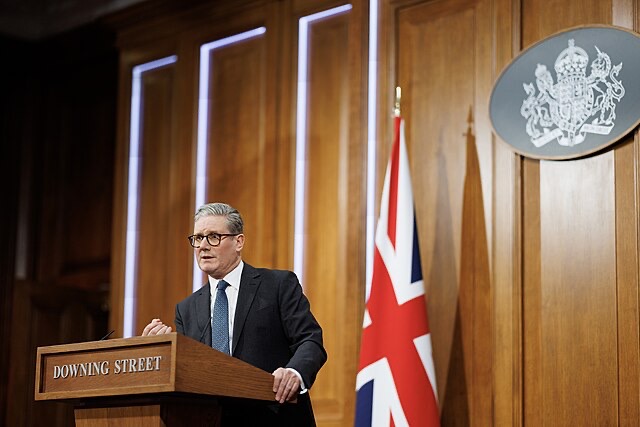A Surge in Channel Crossings Sparks Controversy
In a striking contradiction, Prime Minister Keir Starmer has praised Labour’s efforts to curb illegal migration just as figures reveal more than 30,000 migrants have crossed the English Channel in small boats since he took office. This growing number has triggered widespread concern and political debate, even as Labour touts its new strategy to combat the migration crisis that has long troubled British shores.
So far in 2025 alone, over 6,600 individuals have made the perilous journey—representing a staggering 31% increase compared to the same period last year. The dramatic uptick is casting a shadow over Labour’s early tenure and raising urgent questions about the efficacy of its migration policies.
Labour’s Approach: Rhetoric Meets Reality
Keir Starmer, once sharply critical of the Conservative Party’s migration record, now finds himself under similar scrutiny. In response, he’s pivoted to a tough-talking approach, branding people-smuggling gangs as a direct threat to national security and vowing to “smash” them with new enforcement strategies.
At the heart of Labour’s plan is the Border Security Command, a £150 million initiative announced shortly after Starmer assumed office. This task force is designed to bring together Border Force agents, MI5, Immigration Enforcement, and the National Crime Agency in a coordinated fight against smuggling networks. It reflects a shift in tone from human rights rhetoric to national security urgency.
Despite these measures, many observers argue that the surge in Channel crossings undermines Starmer’s claims of “progress.” The disconnect between promises and outcomes has become a focal point for critics across the political spectrum.
Rwanda Policy Dropped: What Replaced It?
One of Starmer’s first moves was to scrap the Conservative government’s highly controversial Rwanda deportation policy, calling it “dead and buried.” While this decision earned praise from human rights groups, it also left a vacuum in Britain’s migrant deterrence framework.
To replace it, Labour has focused on international collaboration rather than unilateral deportation plans. The UK recently hosted a summit involving over 40 countries—including France, the U.S., and Vietnam—aimed at strengthening the global crackdown on human trafficking and people-smuggling operations.
During the summit, Starmer unveiled a £33 million global anti-smuggling fund, aimed at disrupting criminal networks at the source. Tech companies like Meta, TikTok, and X (formerly Twitter) were also brought into the fold, urged to help clamp down on social media content that facilitates illegal migration.
Starmer’s Tough Talk: “It Makes Me Angry”
Despite rising numbers, Starmer has insisted that his administration is making headway. Speaking to reporters, he acknowledged the public’s frustration: “It undermines our ability to control who comes here and that makes people angry. It makes me angry, frankly.”
His statement reflects a delicate balancing act. While he seeks to maintain Labour’s traditional values on humanitarian protection, he must also respond to voter anxiety over border security—a central issue in British politics over the past decade.
Yet the numbers speak loudly. With more than 30,000 crossings since Starmer took office, his government is now under pressure to show not just intent, but real results.
Tory and Right-Wing Reaction: “All Talk, No Action”
Unsurprisingly, the Conservative Party and right-wing media outlets have seized upon the latest figures as proof of Labour’s ineffectiveness. Former Home Secretary Suella Braverman accused Starmer of being “soft on borders” and lacking the political courage to enact hardline deterrents.
Right-wing commentators have labeled Labour’s new strategy as little more than “PR-driven bluster,” pointing out that similar task forces and funding pledges have failed in the past to stem the tide of small boat arrivals.
GB News, in a sharp critique, noted that “Labour’s Border Security Command sounds tough, but smugglers are still winning.” Headlines from The Telegraph and Daily Mail echoed the sentiment: Labour is now facing the same challenges it once condemned, with no clearer solution in sight.
Migrants’ Journey: Why the Channel Route Persists
Despite new border policies, thousands of migrants continue to risk their lives by crossing the English Channel in overcrowded dinghies. Most originate from conflict zones or economically unstable countries like Afghanistan, Iran, Eritrea, and Sudan.
The persistent use of the Channel route highlights deep flaws in both UK asylum policy and international cooperation. While the UK clamps down on illegal migration, it offers few legal pathways for asylum seekers, forcing many to turn to smugglers.
Without a comprehensive overhaul that includes safe routes, bilateral agreements, and fast-tracked asylum processing, experts warn that no enforcement strategy alone will solve the problem.
Labour’s Future Plans: Kurdistan and Vietnam Deals?
In a bid to show results, Labour is reportedly exploring deals with countries such as Kurdistan and Vietnam—similar to Italy’s arrangement with Albania under Prime Minister Giorgia Meloni. These agreements would aim to halt migrants at departure points, offering local economic aid in exchange for stricter border enforcement.
Such partnerships, however, are still in the early stages and could face legal or diplomatic hurdles. Human rights advocates warn these deals must be carefully structured to avoid violating international refugee conventions.
Nevertheless, Starmer’s government sees these international tie-ups as critical to reducing crossings without resorting to high-profile deportation plans like Rwanda.
Public Opinion: Mixed Feelings on Labour’s Handling
Recent polls suggest British voters remain divided on Labour’s migration strategy. While many support cracking down on people-smuggling gangs and support international cooperation, a growing number are skeptical about whether Labour can truly “take back control” of UK borders.
The concern is particularly acute in coastal regions such as Kent, where local councils are bearing the brunt of migrant arrivals. Residents there report feeling neglected and frustrated, with little faith in promises coming from Westminster.
Starmer’s challenge now lies not only in curbing crossings—but in restoring public confidence that his government can deliver where previous administrations failed.



